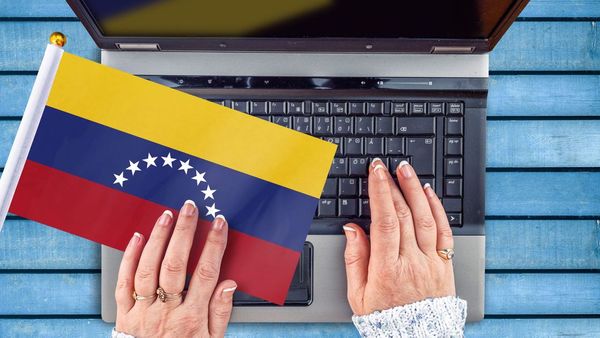
More than a decade before an AI-powered chatbot could do your homework, help you make dinner or pass the bar exam, there was @Horse_ebooks. The primitive predecessor to today’s chatbot renaissance began as a Twitter account in 2010, tweeting automated excerpts from ebooks that, decontextualized, took on unexpected and strangely poetic meanings.
Purportedly a spambot, the account surfaced quotes from ebooks that went viral for their absurdist fragments – phrases like “Hello saxophone,” “COULD THIS BE THE”, and “Today we are lucky to be talking”. It amassed more than 200,000 followers at its peak and now, despite being inactive for a decade, the account still holds 131,000 followers. Its most memorable quip – “everything happens so much” – still resonates today.
In 2013, it was revealed that real-life human being Jacob Bakkila had been responsible for tweets from the account for the preceding two years. The New York City artist purchased @Horse_ebooks from an actual spammer in 2012 and then simulated its “speech” – tweeting excerpts from books at random intervals and “performing” as the bot 24 hours a day, seven days a week.
“My goal was to reverse engineer how the bot approached things on the internet,” Bakkila said. “Nothing that @Horse_ebooks tweeted – either when it was an actual automated spam bot, or when it was myself – was ever written originally. It was always pulled from previously written text.”
By reusing and repurposing existing writing, the account functioned similarly to today’s more advanced chatbots, albeit on a smaller scale. Language learning models, the technology upon which apps like ChatGPT is built, work by crawling large troves of human writing, analyzing patterns in human speech and spitting back that speech to the user based on context clues.
“I wanted to draw on the tension of authorship, both between myself and the fact that it was originally a literal spam bot. When does the bot end and when does the human begin?” Bakkila said.
That question has never been more relevant, as people increasingly use AI-powered chatbots not just as an alternative to Google, but as therapists and friends. AI companies are also under legal threat for their use of existing writing, with authors accusing them of unfairly and illegally using copyrighted works.
The Guardian spoke with Bakkila about human-robot authorship, the alleged AI apocalypse and what the popularity of his spam bot art project means in our modern times. The interview has been edited for brevity and clarity.
@Horse_ebooks is one of the first examples I can remember of a language-based bot the public meaningfully engaged with in such a viral way – what are your thoughts on this new bot-based artificial intelligence boom we are seeing?
I think you flatter me too much when you say it was the first. @Horse_ebooks itself was inspired by a variety of things – most notably earlier models, all the way back to what almost any older millennial will remember – SmarterChild and other early AOL Instant Messenger bots. This idea of automated language is certainly not a new concept. That said, obviously, the sophistication has grown enormously.
It’s important to remember that we are still fundamentally just pulling from pre-established corpuses of work. It’s still just taking language that humans previously wrote and giving it back to humans. So in that sense, even with the enormous variety of sophistication, my understanding is that it’s still humans talking to humans, with a bot as the intermediary.
I’m curious if you have any thoughts on the evolution of AI and chatbots. They used to hallucinate a lot more, their language was a little bit more simple – as they improve, do you think that impacts the experience?
We’ve always foisted human-like traits onto machinery – probably ever since we invented the first machines. People talk to the Roombas as though they are pets. We have AI speakers or smart speakers we are encouraged to talk to as though it’s a normal human conversation. When things break, when things glitch, when things go haywire there’s always a beautiful moment of peeking behind the curtain – understanding and reminding yourself that it is just a machine. With ChatGPT, there was an initial surge of people seeing what they could get ChatGPT to do, and what it couldn’t do.
Invariably, there’s the sine wave of new technology, with people having fun and exploiting it and using it in ways that the people who built it did not anticipate. Then those loopholes get closed and the bugs get squashed, and some of the fun disappears. But people find other ways to use it, again in ways that are counterintuitive and funny and artistically meaningful.
From an artist’s standpoint, what do you think about the integration of AI into the art world? It’s an issue that has obviously been controversial.
I would agree that it’s been controversial, but, like so many things, it might be a little bit of a tempest in a teacup. We live in a time when hot takes are very valuable to people. And there are plenty of people having fun with AI in ways that are interesting and counterintuitive.
It remains to be seen how permanent AI is. Talk to me a year from now, a lot of this could fade, people are already predicting that we’ve reached or are near the height of sophistication for things like language models. The problem with any new type of technology is that, as humans we have a tendency to assume an asymptotic growth. We think, “Wow, this is incredible – I bet it’s going to be 100 times as incredible 10 months from now.” Sometimes that happens, sometimes it doesn’t.
I feel like something’s been awoken in me at the mention of SmarterChild – I completely forgot about that.
Yes, I don’t want to guess how old you are, but I imagine you’re younger than I am – what was your screen name on AOL?
Mine is humiliating – it was PV – because my school was called Pleasant Valley – frog lover, because I loved frogs.
That’s wonderful, really. There’s an innocence and a wonder in the names that we assigned ourselves in those earlier eras of the internet. I believe it still exists now with kids and preteens and teens going on things like Roblox. The song remains the same, but the fidelity at which it is played has changed.
It’s interesting to look at it from that perspective – obviously there’s so much nefariousness about the internet, but there is also an innocence in some parts of it, and people having fun with it. Do you think that still exists within AI, or do you think it’s as scary as people say?
That’s a great question and it really depends on who you ask. There are definitely some things about the internet now that are more pernicious and more volatile than they’ve ever been before – I don’t want to downplay that. But when it comes to people just having fun and experimenting and making things with the tools given them, I don’t think it is appreciably different than it was 10 years ago or 20 years ago. People who forecast too much doom and gloom have a tendency to be wrong. Maybe that’s just my optimistic nature.
There have been a lot of changes to online platforms since @Horse_ebooks was around – what do you think of the changes to Twitter’s character limit?
Back then, there was a 140-character limit on tweets, so it meant the bot would post text that would sometimes be cut off. I adhered to that religiously, and it meant that truncated text was something that you could work with very interestingly. One of the more unexplored aspects of the world as it exists today is that we have such an abundance of information that very few people work counter to that. There are very few comparative mysteries anymore and because information is so freely available. And brevity is rare. I think less is always more when it comes to these types of brief communications.
It’s interesting that through your performance, you were seeking to replicate a bot whereas AI bots are predominantly thought to be seeking to replicate human behavior. What do you think of that?
I would caution with the word replicate, because that’s the difficult part – are we trying to replicate? Are we attempting to imitate? Are we attempting to supplant? I wouldn’t disagree with you that, in shorthand, I was attempting to carbon copy the bot’s process. But I believe my intentions were different. I wasn’t making any kickbacks from the sale of ebooks. That said, there’s also the tension of the Turing test – if a human can’t tell whether or not it’s talking to a bot or a human, does it matter?
In general I think people who are using AI in interesting ways right now are not doing so in an attempt to seek attention or or galvanize either opposition or support. They’re just trying to think, what can I do with AI? It’s incredible to think of what you’d be able to do right now. We are becoming something altogether larger than ourselves – and that is where you can find a very interesting tension because it brings up that age-old question, what does it mean to be human? And of course, we’re no closer to an answer – we are probably further than ever before. But we’ve never been able to ask it so interestingly.
I’m sure you get asked this a lot, but why do you think @Horse_ebooks was so resonant with people?
I can’t say why, but I’m always flattered when I get asked about it. A friend recently pointed out there is a variety of Spotify playlists that use probably my most famous combination of words: “everything happens so much”.
Can you remember where that phrase came from?
It came from a local information product – but then again, did I write it? No. It came from a book about retirement, something like “everything happens so much faster when you’re retired”. We’re all fascinated with things on the internet that we don’t understand and this is the heart of why people are drawn to new technology.
I also find it interesting that in the case of @Horse_ebooks, people felt disappointed or betrayed or something to find out that a human was involved with tweets that they were seeing. Now, it seems like with AI, it’s become the reverse – people are disappointed to find out when something was made by a bot or an AI – do you think that has changed?
I actually think that, like many other technological changes that happen in culture, most people have a pretty good eye right now for text and imagery that has been generated. You see it coming from a mile away. I think that speaks also to how much we read. In the modern era, even if we don’t consciously think of it as reading, so many of us are in front of screens close to every waking moment. The average person has a great degree of sophistication in terms of separating the wheat from the chaff, so to speak.
With all the new technology, is there ever a world in which @Horse_ebooks is resurrected as a new bot?
@Horse_ebooks was a piece that was designed to be an endurance piece and a piece of performance poetry. And in that sense, when a piece is done, a piece is done. I don’t like to retread old territory.







